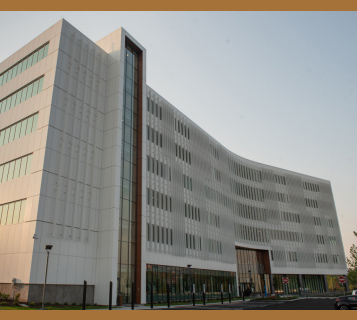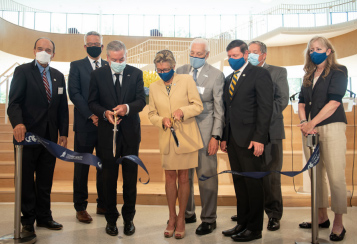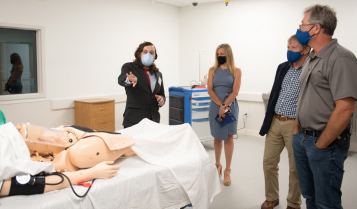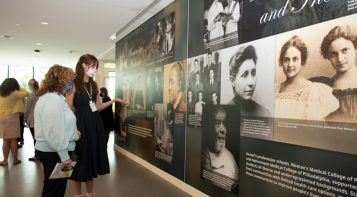New Campus Celebrates Grand Opening, Welcomes Inaugural Class
By Lisa Ryan
Drexel University College of Medicine, Tower Health and local community members came together Tuesday, July 27, to celebrate the grand opening of the new four-year regional medical campus, Drexel University College of Medicine at Tower Health. The campus, within walking distance to and less than a mile away from Reading Hospital, welcomed its inaugural class of 40 first-year medical students in early August.

Charles B. Cairns, MD, the Walter H. and Leonore Annenberg Dean and senior vice president of medical affairs, said he looks forward to the impact of the campus on its community and on medical education. “The opening of this campus is so gratifying and solidifies our college’s vision for a truly community-integrated medical college that spans urban, suburban and rural populations,” Cairns said at the grand opening. “This campus will serve as the intersecting point of our high-quality medical education, patient care, research and service missions.”
The College of Medicine at Tower Health’s four-story campus building includes state-of-the-art medical education technology. Future physicians will hone their diagnostic and interpersonal communication techniques in simulated hospital settings. Like their peers in Philadelphia, students will practice medical interviewing, physical exams and patient counseling with standardized patients, who are trained to portray scenarios and specific medical conditions.
To build skills in scenarios that would be uncomfortable or unsafe to create with a standardized patient, such as a live birth or bout of high blood pressure, students turn to the Simulation Laboratory. The Simulation Lab’s patient rooms are home to computer-controlled robotic manikins whose vital signs and responses to “treatment” are managed by technicians. Sim Lab sessions are filmed for student and faculty review and skills assessment.

A ceremonial ribbon was cut by Drexel President John Fry and Tower Health President and CEO Sue Perrotty (third and fourth from left). Joining them were (L-R) Tower Senior VP and Chief Academic Officer Mark Martens, MD; Drexel Provost Paul E. Jensen, PhD; Drexel Board Chair Richard Greenawalt; Dean Charles B. Cairns, MD; Tower Executive Vice President Daniel Ahern; and Regional Vice Dean Karen Restifo, MD, JD.
The facility also has a fitness center, library, lounges, game room and café space to enhance student wellness. On the building’s upper floors, large windows and an outdoor seating area offer forest and mountain views.
A mural, created by the Legacy Center with materials from its archives and special collections, features the College’s legacy institutions, Woman’s Medical College of Pennsylvania, the first medical school in the world for women, and Hahnemann University, a homeopathic institution that admitted non-traditional students.
“This building and its layout will help the campus to build community and also encourage our students to make strong connections to faculty, staff and professionals,” said Orcel Kounga, director of admissions and student affairs. “Education, innovation, research and collaboration will thrive in one central, unifying space.”

Grand opening attendees toured educational facilities including the Simulation Center.
The campus’s lecture halls, classrooms and common spaces are built to promote collaborative work. Students will work together to connect basic science concepts to medical cases, symptoms and disease presentation in the first-floor bioskills laboratory, and practice crucial skills in the adjacent anatomy laboratory.
Davin Evanson, MD ’25, looks forward to collaborating with his classmates to sharpen various skills they will use as physicians. “One of my goals during my time in medical school is to practice working effectively as part of a medical team,” he said. “Collaborating with my classmates to analyze cases and make diagnosis and treatment decisions will teach me the communication skills and emotional intelligence I’ll need as I work with colleagues, as well as patients and their loved ones.”
The class of 2025 will study the same outstanding curriculum as their peers at Philadelphia’s Queen Lane Campus; all Drexel medical students have the opportunity to complete clinical rotations at Reading Hospital in their final years of medical school.
Reading Hospital, recently named one of U.S. News & World Reports’ top 10 hospitals in Pennsylvania, is Tower Health’s flagship location and the largest hospital between Philadelphia and Pittsburgh. The hospital has been a key site of clinical education for College of Medicine students for more than 20 years. Drexel University President John Fry noted that the opening of the new campus allows for increased collaboration between the organizations, which are both invested in quality medical education.

The mural wall highlights Drexel’s rich history with materials from the Legacy Center: Archives and Special Collections.
“This incredible new campus builds on this great foundation in service of Drexel University, Tower Health and Reading Hospital’s shared educational missions,” Fry said at the grand opening. “There’s no doubt in my mind that our partnership will impact this community positively in so many ways. And as for our students, it will provide great opportunities to train and go on to be leaders in medicine, especially in areas in need of more doctors.”
Josette Graves, MD ’25, looks forward to learning from providers at the hospital. Graves hopes not only to observe surgeries at Reading Hospital, but also to develop skills during her hands-on education that will help her better serve patients. “I hope to learn how to effectively bridge gaps in the system as a medical provider,” she said. “I want to be able to advocate for patients with chronic pain and provide resources, so they don’t have to struggle finding specialized health care close to home.”
Students will not just learn to provide quality health care during their time in medical school. They’ll also connect with the surrounding community. West Reading is home to a diverse and underserved population, allowing students to engage with patients with varied backgrounds and life experiences. The area is also experiencing economic growth, which College of Medicine at Tower Health faculty members see as a positive catalyst in providing further opportunities for medical students’ community engagement and collaborative learning.
Tower Health President and CEO P. Sue Perrotty often hears from residents and local business owners who are excited for medical students to join the community. “They know this partnership will train new physicians to care for their family, friends and neighbors,” Perrotty said at the grand opening. “The medical students, their families and the instructors will live here, work here and they will become customers at local business and restaurants — all making a significant positive impact on the local economy.”
Members of the MD program class of 2025 said they looked forward to getting to know their classmates over meals at local restaurants, and to taking advantage of the area’s parks and trails when they need a study break. Many were also excited to serve the community through their coursework and extracurriculars.

Drexel University College of Medicine at Tower Health’s inaugural class.
Throughout their time in medical school, the College’s MD program students participate in community engagement, lectures and reflective discussions. This work prepares them to address social determinants of health, health disparities and trauma-responsive care, and to become community-responsive physicians.
After deferring medical school for two years to take on a long-term service project, David Talarico, MD ’25, is happy that community engagement will be a major part of his medical education. “I know that I will learn a lot in laboratories and am excited to be back in the classroom again, but I also can’t wait to practice patient interaction through community engagement experiences,” he said. “I’m excited to meet and serve people from different backgrounds.”
Alexis Price-Moyer, MD ’25, grew up in West Reading and is excited to return as a medical student. She believes studying medicine in the area will provide her with opportunities to work with patients from varied backgrounds, and to learn how their life experiences affect their approach to health care. She is excited to help provide care to underserved patients, and about the difference the school will make in the community.
“Having a medical college here will absolutely change the lives of those that may not be as fortunate to see a physician due to cost, and it gives the younger population a clear view that they have the option to pursue a career in medicine,” she said. “It touches my heart that I will be able to give back to a community that I love and have a deep connection to.”
Regional Vice Dean Karen Restifo, MD, JD, said the community has welcomed its newest members with open arms. During MD program student orientation week, students took a walking tour of West Reading in their white coats and were stopped by local business owners and other residents who wanted to wish the future physicians well.
“It’s daunting to start medical school, and for the students to have been embraced by the community this way is a fantastic help,” Restifo said.
Back to Top